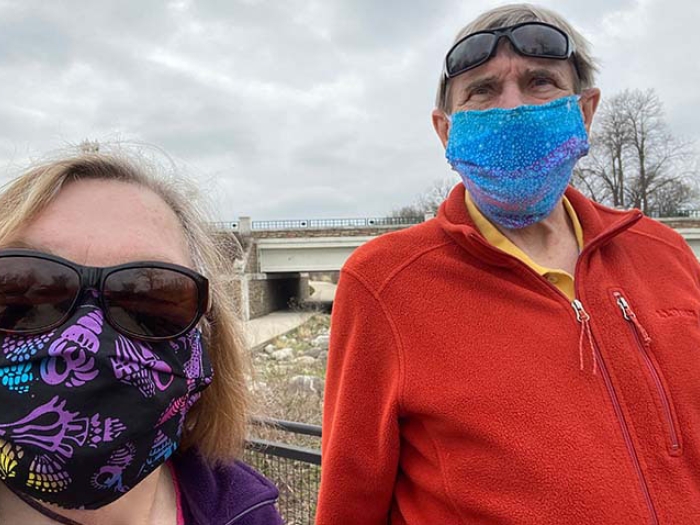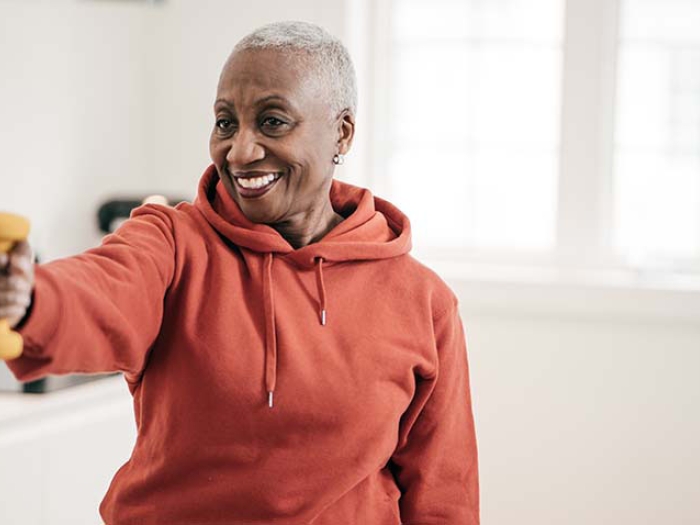With the cardiac rehab clinic now open following the COVID-19 shutdown, one participant shares her thoughts on its benefits and the value of patient camaraderie.
5:00 AM
Author |

We pedal, pump push and climb, working hard to stay alive.
Since we meet three times weekly, we know the drill. Suit up like Martians, place one electrode beneath right clavicle, two beneath chest cavity. We attach a telemetry monitor to our belts, better to track heart activity as we stretch and glide. Blood pressure is recorded while we await marching orders: a written plan tailored to our current level of endurance. An exercise physiologist chooses the equipment du jour, bike, nu-step, elliptical, or treadmill among others, and decides how fast, how long and how challenging our activity should be.
Over treadmill handrails, we chat with fellow "rehabs." We begin with the weather, like strangers on a train. But over time we tell what brought us to the rehab center. We describe our "events," we talk, we listen, we find each other at our next session.
Though we casually bandy words like "ejection fraction" and "cardio myopathy" in the borrowed lexicon of bona fide cardiologists, we don't fully understand the mystery surrounding our "events". But we read, we search the web, we share what we know, and what we don't.
Some find solace in silence. They keep their own counsel and simply take care of business. Others talk reluctantly, but only with staff encouragement. And some of necessity must tell, retell and relive their experiences in an effort to master trauma still etched in their minds.
David, at 53, suffered a massive heart attack and did not register a heartbeat for 45 minutes. His team was ready to declare the end. "But I fooled them," David says with a mischievous grin. "I woke up, began joking with the docs and lived to walk out of the place on my own two feet. When folks ask for my date of birth, I don't know whether to give the day I was born or the day I rose from the dead."
MORE FROM MICHIGAN: Sign up for our weekly newsletter
Everyone has a story. But some only share it in the comfort of a support group. It's here where patients speak the unspoken. It's here where they voice those unbidden thoughts that nettle while other people sleep. It's here where they wonder aloud if they will live to see their adult grandchildren, sail on that much anticipated cruise, enjoy those pleasures long postponed. It's here where they consider a precipitous retirement, worry about finances, imagine spouses living alone. And some speak of a new vigilance, a sudden startle response, braced too often for what might come next.
Senior members of the group describe similar aftershocks following their own procedures, lending credence to their wise counsel. "Trust us," they say, "such feelings are inevitable and these too shall pass."
And what of their long-range, quality-of-life concerns? They also fear a loss of energy, an ardor, a joie de vivre. They fear being hostage to an ongoing disease, symptoms recurring, life interrupted. They wince at the prospect of becoming dependent, a constant burden to family and friends.
Clearly support group participation cannot reverse a diagnosed cardiovascular disease. But the opportunity to express silent forebodings in the presence of trusted "rehabs" lifts the spirit and hastens recovery.
Leah Brock, LMSW, reports that adult children often attend sessions with their parents to better understand their role as caregivers. And many come to learn about a disease they may themselves inherit. In a way, they come to preview their future selves.
Preventive measures are crucial for both generations. Michigan Medicine's Frankel Cardiovascular rehab center offers nutritional advice, primarily a Mediterranean diet, a robust exercise regimen and recommends annual medical examinations regardless of age.
Back in the exercise room, we again pedal, push, lift and glide. Endorphins spike, spirits rise, we're poised for a better tomorrow. Surely treadmills and recumbent bikes assist healthy blood flow, but the value of patient camaraderie cannot be over-stated. Carolyn Palka, a senior clinical exercise physiologist at U-M who artfully initiates patient pairings, insists that such bonding visibly reduces tension and promotes a more enduring outcome.
At rehab graduation time, staff and patients collectively sing, cheer, clap hands and celebrate our measured progress. But most of all, we honor a program that combined physical exercise, emotional support and "cardio camaraderie." A program that touches the heart.
Like Podcasts? Add the Michigan Medicine News Break to your Alexa-enabled device or subscribe for daily updates on iTunes, Google Play and Stitcher.

Explore a variety of health care news & stories by visiting the Health Lab home page for more articles.

Department of Communication at Michigan Medicine
Want top health & research news weekly? Sign up for Health Lab’s newsletters today!





